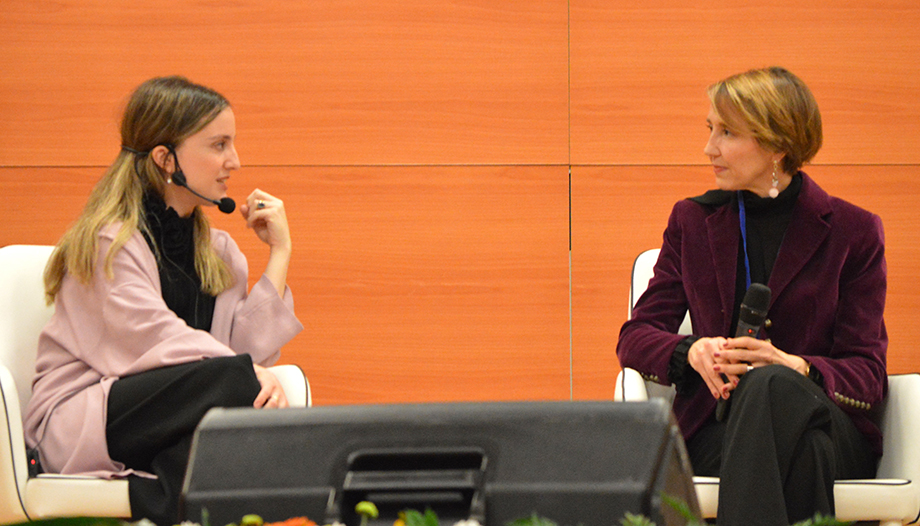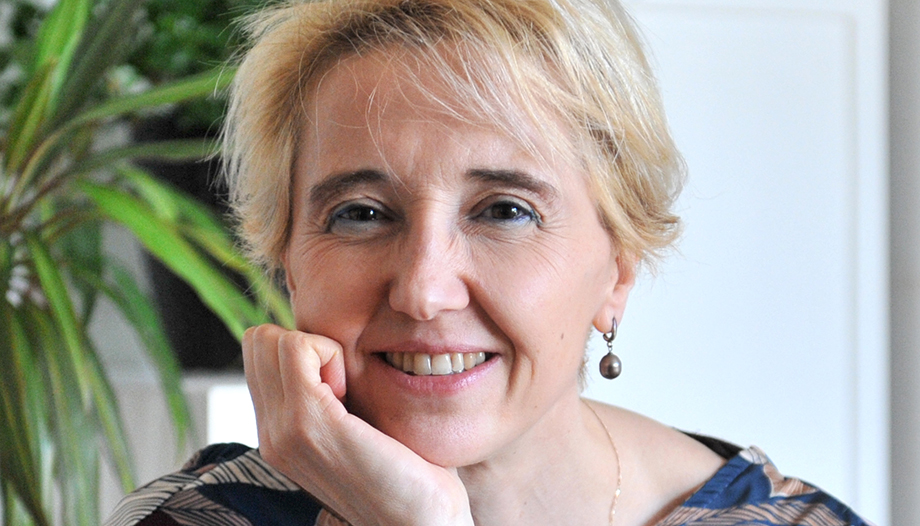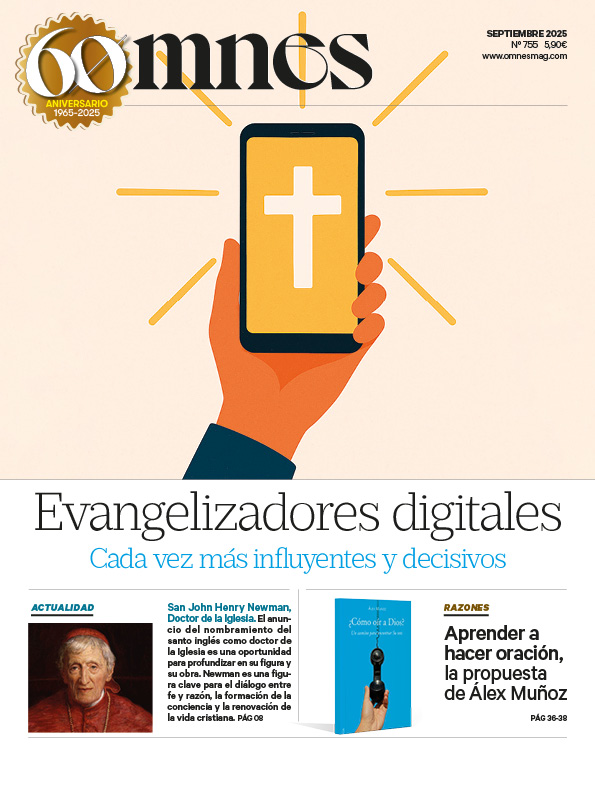When her book "Mujeres Brújula" (Compass Women) went on sale, some called her "the most powerful woman in Opus Dei". A title that Isabel Sanchez continues to laugh at. This fragile-looking laywoman is the director of the Central Advisory Office of Opus Dei. Opus Deithe governing body of the Opus Dei for more than 50,000 women in 70 countries around the world.
A few weeks ago, Sanchez changed the capital of the Tiber for the olive-growing Jaen. There he participated in the XI St. Josemaría International Symposium which, in its eleventh edition, focused on the theme of friendship with speakers such as Enrique García MáiquezLuis Gutiérrez Rojas or Ana Sánchez de la Nieta.
"Friends of God and of men" is how St. Josemaría liked to define the faithful of the Work, a reminder of those "strong friends of God" of St. Teresa of Jesus. Isabel Sanchez speaks to Omnes about friendship, apostolate, youth of heart, and the whole panorama, which is very broad, of the "friends of God and men. lay people in the construction of the Church.
Before talking about anything, we need to be clear about the concept. What do you understand by friendship?
- I like to define it as a finding of the heart. It is the affectionate relationship that arises from a chance encounter with someone in whom we find full acceptance, a certain inner harmony and disinterested help, to face the world together, in some of its aspects.
Through relationship and habit, this relationship can become deeper, stronger and more powerful. By the way it arises (it is found) and by the way it affects our life (it enriches it), we can say that friendship is a human treasure.
One of St. Josemaría's best known works, in fact, Friends of God. We talk a lot about "friendship with God", but perhaps, we do not know how to be friends with "men" and even a disinterested friendship seems "suspicious" to us... Do we have a starting problem?
- I am pleasantly surprised that you say that we talk a lot about friendship with God. The truth is that, in my environment, with my friends, I have not seen that it is so common to talk about it: rather I come across a certain indifference to the religious or, in the best of cases, with a desire to reach an intimate relationship with God without knowing how to connect with Him ...
In any case, since God became Man, the circle is closed: every friendship with another man has something divine about it and every friendship with Jesus Christ enhances and ennobles friendship with men. The only starting problem could be self-centered individualism or what Pope Francis calls the globalization of indifference.
If we close in on ourselves, we make ourselves incapable of friendship, both with others and with God. St. Josemaría invites us, putting this invitation in the mouth of Jesus Friend: "Come out of this narrow life, which is not life" ("...").It is Christ who passes", n. 93)
Today's youth will live friendship the way we adults teach them to live it.
Isabel Sanchez. Secretary General of Opus Dei
In the St. Josemaría Symposium Do you think that young people conceive and live friendship in a completely "surrendered" way?
- Youth is a vital stage in which one goes out, so to speak, from home to the world. It is a time of exploration of the human universe in which friends take on a special relevance. Friends are those with whom one goes out to navigate life.
Young hearts are always ready to give their all, but this is a learned art. Today's young people will live friendship the way we adults teach them to live it: our example counts a lot; the models we show them in series, movies, novels; the life and narrative of the influencers...
One of the first things that digital natives must learn is to distinguish between friends and followersFriendship requires presence, time and applying the logic of gratuity, not that of the market.
Speaking of disinterested friendship, St. Josemaría used to say that "out of a hundred souls we are interested in a hundred" How can we combine friendship and genuine apostolic vocation without instrumentalizing friendship?
- The genuine apostolic vocation starts from a total respect for the freedom of God - who seeks friends, not slaves -, for one's own freedom - recognized as a great gift that cannot be used to subdue others - and for the freedom of the friend, whom one loves in all his dignity.
The apostle friend proclaims Christ, illuminates the way to Him and does everything possible to kindle in the friend a desire for God. It is a help to enkindle within the person a divine spark that he or she already has, even if sometimes obscured or distorted. It does not market an external good, but helps to discover an inner treasure that belongs to the other, but that he has to decide whether to welcome and cultivate.
The apostle, like Jesus, does not give in order to receive; he simply gives himself, running the risk of freedom.

A friendship is a reciprocal act... and in the case of God completely asymmetrical. What does man "contribute" to God?
- This is a great mystery, but God himself has told us what he wants from us: "Give me your heart, my son" (Prov, 23:26).
What man brings to God is nothing more and nothing less than free correspondence to his Love. Each small act of love is a beautiful and joyful novelty in Creation; that is why we are all important to Him.
As a numerary of Opus Dei, you live and work like any normal layperson, following the spirit of St. Josemaría. How did St. Josemaría live this friendship with "heaven and earth"?
- With a heart of flesh, noble, generous and undivided. With the same heart with which he loved his parents tenderly, his friends strongly, his children unconditionally, the world passionately, with that same heart, he loved Jesus Christ madly. For him, charity and friendship were fused into one and the same thing: divine light that gives warmth (Forge, 565).
And all this with great grace: divine grace, which led her to give herself with great generosity to God and to others, and human grace, made up of a smile and good humor.
Is there still a long way to go inside and outside the Church in the understanding of a 100% relationship with God on the part of the laity?
- It seems to me that there is still a long way to go before we understand the power of the millions of lay people who make up the vast majority of the Church. We can delve even more deeply into the transforming power of simple baptism, which enables us to reach the highest intimacy with Christ, even to the free and exclusive surrender to Him in the midst of the world, and that of the sacrament of confirmation, which gives us a genuine apostolic impulse, arising from the configuration with Him and the power of the Holy Spirit.
But the Holy Spirit, the great Master, is raising up many examples of this "sanctity next door", as Pope Francis has called it, so that we can see through our eyes to what heights of spirituality the simple baptized are called to. It is enough to think of Carlo AcutisChiara Corbella, Guadalupe Ortiz de Landázuri and many others: a whole chain of young friends of God.







